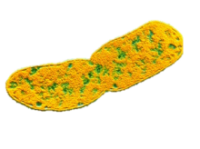
General Information
Klebsiella [kleb−see−ell−uh] is a Gram-negative bacteria (bacillus) that can cause different types of healthcare-associated infections, including pneumonia, bloodstream infections, wound or surgical site infections (SSI), and meningitis. This organism is normally found (normal flora) in the human intestines and is usually excreted in human stool. In healthcare settings, these infections commonly occur among sick patients who are receiving treatment for other conditions. Patients whose care requires devices like ventilators or intravenous catheters, and patients who are taking long courses of certain antibiotics are most at risk for infections. Healthy people usually do not get these infections.
Transmission
In healthcare settings, it can be spread through person-to-person contact. This may occur via the contaminated hands of healthcare personnel, or by contamination of the environment or equipment. The bacteria are not spread through the air. Patients may be exposed to it when they are on ventilators, or have intravenous catheters or wounds that are caused by either injury or due to surgical procedures. Because these medical devices and conditions are associated with breaks in the skin or other mucous membranes, this may allow it to enter the body and cause infection.
Prevention
To prevent spreading the infections between patients, healthcare personnel must follow specific infection control precautions. These precautions may include strict adherence to hand hygiene and wearing gowns and gloves when they enter rooms where patients with Klebsiella–related infection are staying. Healthcare facilities must also follow proper cleaning procedures to prevent the spread of it. Certain protocols should be followed to prevent device-associated infections, wound infections and SSIs. A breakdown in these protocols may lead to infections with Klebsiella or other healthcare pathogens.
Drug-resistant Klebsiella
Some of these strains have become highly resistant to antibiotics. This occurs when bacteria such as Klebsiella pneumoniae produce an enzyme known as a carbapenemase (referred to as KPC-producing organisms). This species belongs to the family Enterobacteriaceae, a normal flora of the gastrointestinal tract that can become carbapenem-resistant (CRE stands for carbapenem-resistant Enterobacteriaceae).Unfortunately; carbapenems are often the last line of defense against Gram-negative infections that are resistant to other antibiotics (see CRE CleanPath document for more information).
Treatment
These infections that are not drug-resistant can be treated with antibiotics. Infections caused by KPC-producing bacteria can be difficult to treat because fewer antibiotics are effective against them. In such cases, a microbiology laboratory must run tests to determine which antibiotics will treat the infection.
Guidelines and Recommendations
There are no guidelines specific for this organism. Healthcare facilities must follow the general guidelines for hand hygiene, environmental hygiene, and guidelines for the prevention of device-associated infections and SSI.
Cleaning and Disinfection
Klebsiella is a Gram-negative bacillus which is susceptible tomany Diversey disinfectants:
See table of recommended disinfectants in the PDF link below.

